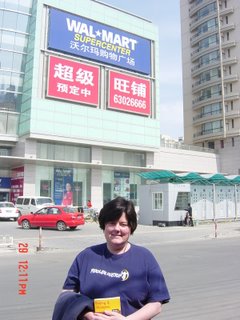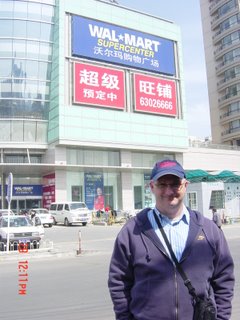Wednesday, March 29, 4:02 p.m.
By Terry R. Cassreino
BEIJING – Hattiesburg has two, Jackson has two, Meridian has one.
We’ve visited them in nearly every place we’ve been including Florida, South Carolina, Tennessee, Texas – and even Mexico.
 And now we can stand up and proudly say we’ve visited one in China.
And now we can stand up and proudly say we’ve visited one in China.What am I talking about? That sales giant that has re-written the book on how to be a major worldwide success in retailing, the company that has helped change the face of America and now has its sights set on the world.
Wal-Mart, of course.
Pam and I took a taxi from our Beijing hotel for a 45-minute drive darting in-and-out of bumper-to-bumper expressway traffic to spend a couple of hours exploring that ever growing monument to Sam Walton's business prowess.
And after stepping inside, the first thing that struck me was it looked exactly like the Wal-Mart in Hattiesburg not too far from our Lamar County house. Sure, the exterior is a little different with Chinese characters beneath the English name.
But just about everything else is the same, including large signs that hang from the ceiling proclaiming that Wal-Mart has the lowest price always. And the store also features the Great Values generic line of products.
There are, however, a few cultural differences – some of which seem, and are, obvious.
- American products dominate the shelves, from Nestle products to Budweiser imported beer. The only catch is that Chinese characters replace much of the English labels, giving them a strange, surreal look.
- Coca-Cola products don't dominate the soft drink shelves in Wal-Mart like they do in Hattiesburg, Jackson, New Orleans and other parts of the South. Coke shares a small but equal space with Pepsi products.
- While Coke's English names are replaced with Chinese characters, the company managed somehow to retain its trademark “wave swish” in its name. And the 12-ounce cans are a throw back to the 1970s with pull-tab pop-tops.
- Potato chips are the only snack chips you can find; don’t look for tortilla chips because you’ll be there forever. Lays even has flavors you can’t find in the United States such as Swiss cheese potato chips, beef potato chips and chicken potato chips.
- Rows and rows of ramen noodles line the shelves along with more brands of soy sauce then you thought existed. I thought La Choy was the biggest brand name; heck, you can't find any La Choy products here.
- Want really fresh seafood? You came to the right place because Wal-Mart has two rows of tanks filled with live fish, eels, lobsters and crabs swimming around ready for you to buy, scale, gut and cook at home.
- One display case had fresh shrimp sitting on piles of crushed ice. As I stood and watched, one shopper casually searched through the shrimp and hand-picked the perfect dozen for some dish I imagine she planned to cook that night.
- Piles of small baby octopus sat open in one bin waiting for shoppers to take them home for dinner; fresh fish sat on dislay atop ice much like they did when Pam and I visited the Wal-Mart SuperCenter in Cancun, Mexico, about five years ago.
- And don't forget about the roasted ducks. While Wal-Mart has found a niche in the United States selling roasted chikens for less than $5 each (or something like that), here they sell roasted duck complete with the neck and head (but no eyes) for about the same price.
 While some visitors head for the commercial spots – which I'm sure Pam and I will do before we leave China – we also like to get a taste of local life, find out what people buy and eat on a daily basis, look at some of the items you can't buy back home.
While some visitors head for the commercial spots – which I'm sure Pam and I will do before we leave China – we also like to get a taste of local life, find out what people buy and eat on a daily basis, look at some of the items you can't buy back home.We've found that fascinating whenever we traveled to Mexico, Roatan, Belize and Jamaica on cruises we’ve taken since we've been married. And even though it's easy to take jabs at Wal-Mart, its Beijing store nevertheless offers a different glimpse at Chinese life.
One thing is clear, though. As much as we complain in the United States about how we are losing our identity, our own brand-name products have a strong presence on shelves in China, Mexico, Belize, Roatan and other countries.
That also goes for American pop culture. Flip on the television in a Chinese hotel room and you likely will see the latest episode of such American TV hit series as “Alias,” “Lost” and even reality shows like “Fear Factor” and “The Amazing Race.”
As for Wal-Mart in China, the Beijing store won’t be the last one we visit.
Holt International Children's Services plans to take us to the Wal-Mart SuperCenter in Nanchang on Tuesday so we can buy supplies for our baby – and Pam and I more than likely will keep our eyes open for any interesting differences between that store and the one in Beijing.
Text and photos copyright 2006 by Terry R. Cassreino.

No comments:
Post a Comment